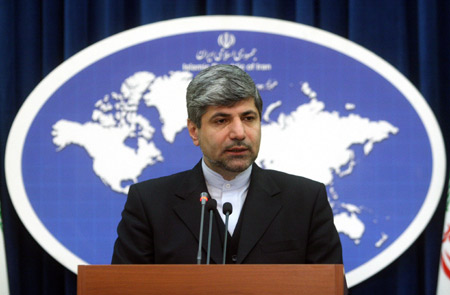Iran slams Western 'use of human rights as political tool'

By Sara Rajabova
Iran's Foreign Ministry spokesman has slammed the "use of human rights issues as a political tool" by Western countries against independent nations, IRIB news agency reported.
Ramin Mehmanparast said on Wednesday that in accordance with its Constitution and Sharia law, Iran considers supporting and helping to increase respect for human rights as one of its ideals.
"These Western countries exaggerate and demonize the human rights situation in Iran while they have not only closed their eyes to the dire rights situation in their...countries but are also unable to be accountable for the numerous violations of their own citizens' rights," Mehmanparast added.
According to him, many of the so-called advocates of human rights have a track record of "systematic and horrible cases" of rights violations.
On Tuesday, a committee of the UN General Assembly passed a non-binding resolution about the human rights situation in Iran, which was drafted by Canada and co-sponsored by other Western countries. 83 countries voted in favor of the document, while 31 - against it, and 68 abstained.
The resolution hit out at torture and executions in Iran, "widespread" restrictions on freedom and "pervasive" violence against women. It will go to a formal vote in the General Assembly in December.
Iran's UN Ambassador Mohammad Khazaee said on Wednesday that the UN resolution on the human rights situation in Iran was "politicized and counterproductive," Press TV reported.
The ambassador stated that the Western-backed resolution "directs the environment towards further polarization and politicization of human rights in the UN" and only serves "the short-sighted political interests of a few countries."
He said the resolution was unbalanced and contained 150 "unsubstantiated" allegations. China, Russia and Syria were among those countries which voted against it.
Besides, Secretary of Iran's High Council for Human Rights Mohammad-Javad Larijani criticized the Western definition of human rights, saying Iran follows a strategy of active and wise interaction with other countries on issues relating to human rights.
He said Western countries do not have the right to impose their own definition of human rights on other countries and undertake the lead over other societies.
"The universality of human rights does not mean that a group can instill their demands onto others but [means] that the instances and models of human rights must be defined according to the tastes, cultures and beliefs adopted by every particular society," Larijani added.
He said that the issue of human rights provided a framework for interaction between different societies and noted that Iran interacted with other members of the UN while adhering to Islamic beliefs.
Larijani also criticized the report of Ahmed Shaheed, the UN special rapporteur on human rights in Iran, as biased and brimful of libel against Iran.
In his report issued in October, Shaheed accused Iran of various cases of human rights violations. Following its release, Iran's human rights council criticized it as a "propagandist text against the Islamic Republic" and said it lacked liability and integrity.
Here we are to serve you with news right now. It does not cost much, but worth your attention.
Choose to support open, independent, quality journalism and subscribe on a monthly basis.
By subscribing to our online newspaper, you can have full digital access to all news, analysis, and much more.
You can also follow AzerNEWS on Twitter @AzerNewsAz or Facebook @AzerNewsNewspaper
Thank you!
